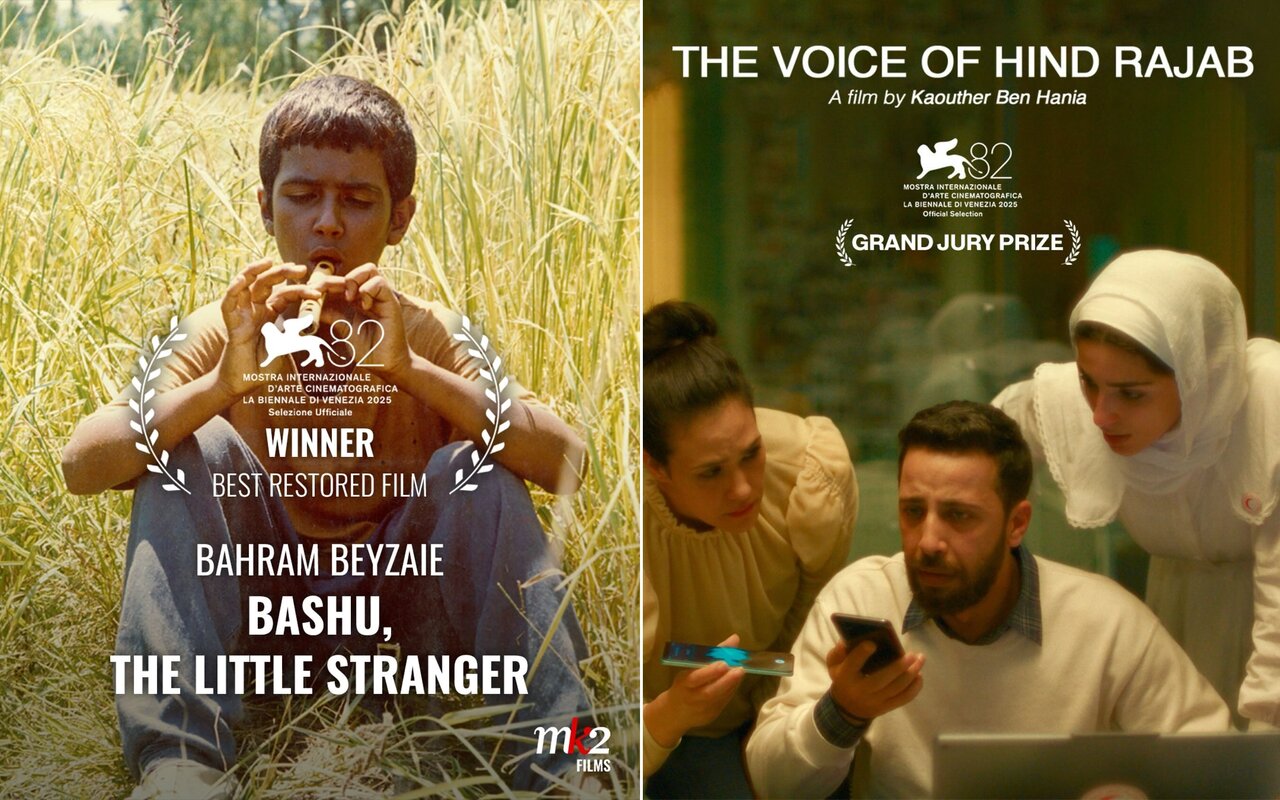Films about Iranian, Palestinian children recognized at Venice Film Festival

TEHRAN – The Iranian drama “Bashu, the Little Stranger” directed by Bahram Beyzaie and “The Voice of Hind Rajab,” a Gaza-set drama by Tunisian filmmaker Kaouther Ben Hania won awards at the closing ceremony of the Venice Film Festival on September 6.
Beyzaie’s 1989 film won the Venice Classics award for Best Restored Film and the docudrama about Israel’s killing of a five-year-old Palestinian girl during its ongoing genocidal war on Gaza received the Silver Lion Grand Jury Prize, Honaronline reported.
“Bashu, the Little Stranger” was restored in 4K at Roashana Studios with the support of the Institute for the Intellectual Development of Children and Young Adults (known as Kanoon). The film was presented by mk2 Films.
The Venice Classics section of this year’s edition of the festival included 18 classic films from across the globe, including “Matador” by Pedro Almodóvar (1986), “Blind Chance” by Krzysztof Kieślowski (1981), “Kwaidan” by Masaki Kobayashi (1965), and “House of Strangers” by Joseph L. Mankiewicz (1949).
As an anti-war masterpiece, “Bashu, the Little Stranger” has a simple story. It depicts the story of Bashu, a southern Iranian boy who, after losing his family during the 1980-1988 Iran-Iraq war, runs away in search of refuge and is taken in by Naii, a woman living with her two young children in a village in the northern part of the country.
Despite their linguistic, ethnic, and racial differences, neighbors’ gossip, and the economic challenge of feeding a new family member, Naii accepts Bashu and prepares to convince her disabled husband when he arrives home from a work-related trip.
The touching, acclaimed drama, however, carries subtle undertones about human emotions like love, acceptance, loneliness, and unfamiliarity.
In 1999, the film was voted the best Iranian movie of all time by a poll of 150 movie experts.
The docudrama “The Voice of Hind Rajab” had taken the festival by storm with its urgent depiction of a young girl’s pleas for rescue.
“Cinema cannot bring Hind back, nor can it erase the atrocity committed against her. Nothing can ever restore what was taken, but cinema can preserve her voice, make it resonate across borders,” said Ben Hania, accepting her award. “Her voice will continue to echo until accountability is real, until justice is served.”
The film tells the true story of Hind Rajab, who was killed by Israeli occupation last year, as she and her family tried to evacuate Gaza City.
It uses real audio from Rajab’s hours-long call to the Palestine Red Crescent Society, in which rescuers tried to reassure her as she lay trapped in a bullet-ridden car with the bodies of her aunt, uncle, and three cousins, who had all been killed by Israeli fire.
Hind Rajab was then also killed, as were the two ambulance workers who went to the scene to try and rescue her.
“It is tragically the story of an entire people enduring genocide, inflicted by a criminal Israeli regime that acts with impunity,” Ben Hania said.
“Tonight, this story is not only about memory, it is about urgency. Hind’s mother, Wissam, and her little brother, Iyad, are still in Gaza. Their lives remain in danger, as do the lives of countless mothers, fathers, and children who wake up every day under the same sky of fear, hunger, and bombardment,” she added.
“I urge the leaders of the world to save them. Their survival is not a matter of charity. It is a matter of justice, of humanity, of the minimum that the world owes to them,” the filmmaker stressed.
“I also call for an end to this unbearable situation. Enough is enough. Once upon a time, a wise man named Nelson Mandela said: ‘We know too well that our freedom is incomplete without the freedom of the Palestinians.’ Today, his words ring truer than ever,” Ben Hania concluded.
“The Voice of Hind Rajab” premiered at the Venice Film Festival to thunderous acclaim, receiving a record 23-minute standing ovation.
At the screening, the audience erupted in tears and chants of “Free Palestine” while waving Palestinian flags.
“I dedicate this award to the Palestinian Red Crescent and to all those who have risked everything to save lives in Gaza. They are real heroes,” Ben Hania posted on Instagram, captioning a photo of herself holding the award.
In her Instagram post, Ben Hania shared a message from Hind’s mother, Wissam. “I want to say thanks to you, to the whole team, and to everyone who supported the film, supported me, and supported this story,” she said.
Hind’s mother, Wissam Hamada, speaking from Gaza City, said she hopes the film will open the world’s eyes: “The whole world has left us to die, to go hungry, to live in fear, and to be forcibly displaced without doing anything.”
Tunisia has already submitted “The Voice of Hind Rajab” as its entry for this year’s Best International Feature Oscar.
SS/SAB
Leave a Comment